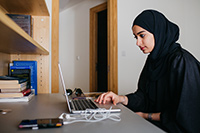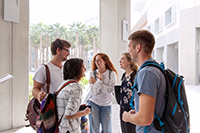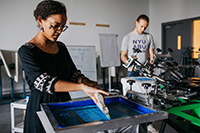July 1, 2020
Thank you to the hundreds of students, faculty, and staff who took part in our recent Forum on Race and Community. My thanks as well to Lisa Coleman and Ann Morning, and to all who contributed reflections, insights, questions, and observations.
I write now to reaffirm my commitment to making sure that NYUAD, as an institution and as a learning community, examines and combats racism so that it may become a community where all can belong. To advance that ongoing work, I will outline the specific action items for the near term that I discussed at the forum.
Persistent anti-Black racism and violence in the US and around the world has brought issues of inequality and injustice to the fore. The problem is not new in any way, but its severity is holding the attention of the global community as never before. NYU Abu Dhabi welcomes this focus, as we were created to fight and solve systemic, wicked problems.
Nevertheless, even our diverse University is not immune to racism. Searing experiences recounted by students in The Gazelle and many other conversations have shown us that these challenges do exist on our campus and have negative impact on our Black community members. Moreover, if any group in our community suffers from instances of systemic bias, our institution as a whole is not living up to its founding values. And so we need to work together to address and dismantle systemic racism, and strive to become an inclusive and equitable community anchored in mutual respect and solidarity.
As one of the most diverse higher education institutions anywhere, we are well positioned to foster a culture of belonging that can be an example for a fractured world. The work involves learning to recognize, examine, combat, and dismantle the policies, practices, and mindless habits that all play their part in upholding racism and unjust privilege.
Many colleagues and students have pointed out to me that much of this work has been pursued in various ways over the years, but that this has often happened in isolation or with insufficient follow through. We all recognize that it will take time to make NYUAD a fully inclusive institution that combats racism wherever it undermines our community values. With the outstanding inputs of many Black community members and allies these past weeks, we have identified several areas where this work should proceed with greater resolve, focus, and results.
As Vice Chancellor, and on behalf of the NYU Abu Dhabi leadership, I therefore commit to:
- Provide mandatory training on diversity, race, inclusion, and equity to all members of the University’s academic and operational leadership teams this summer, and do so in the course of the next academic year for all faculty, administrators, and staff. The workshops will be intellectually engaging and current with the latest research on diversity and inclusion.
- Together with NYU’s Office of the Provost and Office of Global Inclusion, Diversity, and Strategic Innovation, participate in the development of required learning modules on diversity, equity, and inclusion for NYU students, and require them for our students.
- Develop better, properly nuanced ways to describe our campus population in terms of diversity and inclusion, so that measures of progress can be developed.
- Enhance our efforts to increase the presence on our faculty of scholars from underrepresented communities, and especially Black faculty of African, African American, and Caribbean heritage and other faculty of color. NYUAD will pursue this goal building on the work already underway by the office of the Vice Provost for Faculty Development and Diversity, such as making data about faculty and staff demographics available to all programs and search committees, requiring implicit bias training of all search committees and promotion and tenure review committees, and establishing clear understandings of ways to ensure diverse pools of candidates. These well established methods include studying existing academic pathway programs for scholars from underrepresented communities and accessing truly diverse networks.
- Provide resources to support the faculty’s interest in creating more equitable and inclusive learning environments, including reviews of curricula, syllabi, and pedagogical methods to ensure a rich diversity of perspectives across our educational offer. This work may include the generation of new courses and co-creation of courses across programs, with the active participation of students.
- Provide resources and venues for faculty, students, and staff to engage with research focused on dismantling racism in relation to disciplines and social practices, including a new series of talks, panels, and workshops involving NYUAD and NYUNY scholars of race in relation to STEM fields, social sciences, and the arts and humanities.
- Support the interests of our Black students in creating a Black students association that would build on the important and continuing work of Africa Global, AZIZA, and the Caribbean Students Association.
- By the end of 2020, review hiring, performance evaluation, promotion, and vendor selection policies to ensure equitable and inclusive practices are maintained, and a culture of belonging is fostered across the institution.
- Expand programs to amplify diversity and mobility among staff at all levels of our administration through mentoring and training programs, several of which have already been designed to be launched this coming academic year.
How will we see through these initial commitments, and hold ourselves accountable across the institution? Three important processes are underway to institutionalize the work underway and connect efforts across our academic, campus life, and operational divisions and departments:
- We are in the final stages of the search for a new Director of Inclusion and Equity. The first responsibility of the Director will be to launch a community climate survey in the fall, from which the Director will develop programming, initiatives, and ultimately an overarching strategy for inclusion, diversity, belonging, and equity. I am committed to providing additional resources to this office and ensuring the staff have the support they need to help NYUAD become a truly inclusive institution, in partnership with SLICE, the office of Faculty Development and Diversity, and all of us dedicated to this work.
- To ensure that we make such progress, I will appoint and charge an Implementation Committee on Race, Diversity, and Belonging that will coordinate these efforts, and other initiatives the Committee may recommend, across our faculty, student, and staff communities.
The Implementation Committee will have representation of students, faculty, and staff, including the new Director of Inclusion and Equity, and significant participation of Black students. I say this in full awareness that too often the burden of holding institutions and individuals accountable in matters of racial discrimination has fallen to Black students, faculty, and staff, and that this work requires persistent and energetic allyship. I expect that this Committee will provide the institutional heft and action-oriented approach we need to make progress on this shared responsibility.
The Implementation Committee will meet at least monthly with me and members of the Vice Chancellor’s leadership through the Academic Year 2020-21. Next summer, we will evaluate the status of the work, and how the Implementation Committee may evolve.
- To ensure that the work of the Implementation Committee has the full support of my office and the academic and administrative offices, I have asked Provost Fabio Piano, Chief Administrative and Business Officer Peter Christensen, and Chief of Staff Jessica Sederquist to develop and put in place a structure for rigorous evaluation and accountability on our progress, working with and through the Implementation Committee.
NYUAD is a remarkable, mission-driven institution. Our great community has come forward with strong commitment and renewed resolve to do what is right and necessary. We will tap into our strengths as a learning institution designed to improve our world, and we will make our campus one where everyone can thrive.
In solidarity,
Mariët
 Your journey to NYUAD starts here. Attend an application workshop or information session.Admissions Events
Your journey to NYUAD starts here. Attend an application workshop or information session.Admissions Events Live the possibilities. Be part of a dynamic community of students from over 115 countries.Take a Tour
Live the possibilities. Be part of a dynamic community of students from over 115 countries.Take a Tour